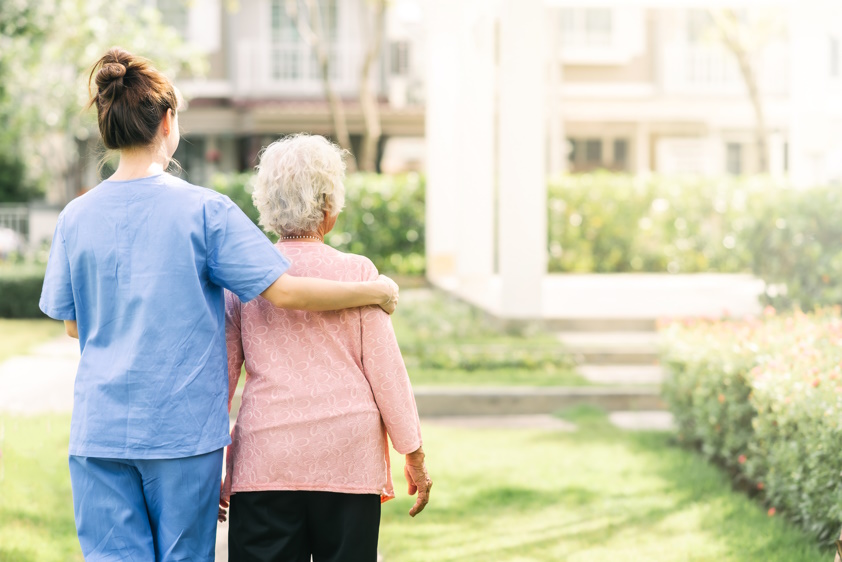Home Health Care Services in Missouri and Kansas Can Help You Address The Problem
It’s a scenario we’ve seen often: You’ve fallen and hurt yourself. As a result, you’ve had to seek medical care in a hospital. Now that you’re discharged, your physician has approved home health care – an intermittent skilled nurse visit and physical and occupational therapy in your home to ensure you’re recovering well where you live.
If you want to maintain your independence, it’s important that you learn what may be causing you to fall and how to address the problem. By taking action now, you can reduce your risk of falling in the future as you continue living at home. Keep reading to learn why elderly people fall and what you can do to prevent it – including making changes around your house or requesting in-home care.
Causes of Falls
Falls are common in the elderly; in fact, they’re the top cause of accidents in people older than 65. The three most common reasons the elderly fall are:
- Balance problems coupled with muscle weakness
- Vision loss
- Chronic health condition that leads to dizziness or fainting
But there are plenty of other reasons the elderly are prone to falling. These can include, but are not limited to:
- Poor lighting
- Trip hazards around the home (such as pets, area rugs, or other furnishings)
- Medication side effects (such as those prescribed for depression, high blood pressure, sleep issues, heart conditions, or diabetes)
Ways to Reduce Your Risk of Falling
The American Academy of Family Physicians suggests reducing the likelihood and frequency of falls by taking a few easy precautions and preventive measures, including:
- Wearing shoes with nonskid soles.
- Using night lights in your hallways, staircases, bathroom, and bedroom.
- Never attempting to walk around your home without turning on the lights.
- Installing grab bars in your bathtub/shower and toilet areas.
- Neatly arranging electrical cords so they do not obstruct walkways.
- Adding handrails on both sides of your stairways.
- Avoiding waxing your floors.
- Ensuring all walking surfaces are smooth and even, including sidewalks, garden paths, and your home’s flooring.
- Having your vision and hearing checked every year.
- Visiting your doctor to care for your feet.
- Reporting medication side effects to your doctor right away, especially if you’re feeling dizzy, lightheaded, confused, or unsteady.
- Using a mobility assistance device, such as a cane or walker.
- Slowly standing up from your sofa or bed.
By implementing these changes in your home and daily routine, you can reduce your risk of falling in the future. Don’t be afraid or ashamed to ask for help making these changes; it’s better to feel a little embarrassed asking for help now than getting seriously injured in your next fall.
How Home Health Care Helps
Your physician had the foresight to authorize home health care for you as you recover. This is already a step in the right direction for you!
If necessary, you will be assigned a skilled nurse to visit your home. But your home health care service may also coordinate physical or occupational therapy that your physician orders, too. Both physical therapy and occupational therapy can greatly benefit patients who have a history of falling. This collection of home health care providers helps to ensure a speedy recovery and keeps you safe!
Your physical therapist (PT) can help you strengthen your muscles so you’re better able to balance and “catch yourself” if you begin to fall. Your PT will walk you through exercises to do during your therapy session, evaluate your progress, and give you exercises you’ll practice between their visits.
Your occupational therapist (OT) can teach you how to safely perform your activities of daily living and show you how to properly use a walker or cane. Your OT may help you navigate your home and advise you on the safest paths to take as you walk. They may even suggest some minor modifications you could make – like relocating furniture or removing a throw rug that trips you up – to reduce your risk of falling.
If Falls Continue
Sometimes, you can do everything right and still experience a traumatic fall. If fall injuries are becoming a major problem, or if you need more help as you recover from repeated falls, it may be time to consider additional in-home care services, such as private duty care.
A private duty caregiver can help you with your daily routines, keep you company, assist you with bathing, prepare meals for you, or perform light housekeeping. Their presence in your home helps prevent falls because you have someone there to help you and come to your aid; they can even help you maintain your independence for longer. You can receive private duty care alongside home health care, too.
You can request both home health care and private duty care through Phoenix Home Care & Hospice. Our compassionate team will help you determine how often and for how long your caregiver will visit, how they will help you, and more. Call us to discuss your options, or ask your physician to request us as your home health care provider.






